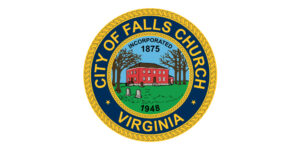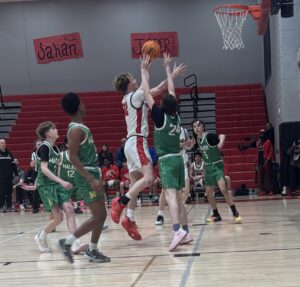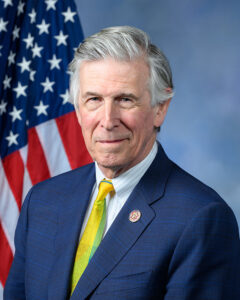
When the Rev. John Ohmer stepped to the stage of the annual Greater Falls Church Chamber of Commerce awards banquet earlier this month on behalf of the Falls Church Episcopal Church to receive the Chamber’s James S. Elkin Memorial Award for Humanitarianism, it was coincidentally on the anniversary of a very special day.
Four years to the day earlier, on March 10, 2014, the Falls Church Episcopal was finally and decisively, after an eight year struggle, given back control of its historic property in the center of the City of Falls Church. That was the day when the U.S. Supreme Court announced it would not consider an appeal of a Fairfax Superior Court ruling that the property, including its historic 1763 church building, graveyard and 1993 sanctuary, belonged to the Episcopal Diocese of Virginia.
Now, this Holy Week, the fast-growing Falls Church Episcopal is fully engaged, with a Maundy Thursday service today (Thursday) at 5:30 p.m. in its Fellowship Hall that will include the preparation of hygiene kits for those living at the Bailey’s Crossroads homeless shelter, and at 7:30 p.m, with a celebration of the Lord’s Supper in the form of sharing a full meal. On Good Friday, a 5:30 p.m. service for children to experience the narrative of Jesus’ last week, and a service of liturgy and Taize meditations at 7:30 p.m. Holy Saturday there will be a service for those who mourn at 9 a.m., gathering in the Memorial Chapel in the church yard, and Easter Morning there will be three services, at 8 and 9:30 a.m. in the historic church, and 10 a.m. in the main sanctuary.
It was in December 2005 that a majority in the congregation of the Falls Church followed the lead of its rector at the time and voted to leave the Episcopal Church along with congregations of 11 other Episcopal churches in Virginia and soon aligned with a Nigerian Anglican bishop to form the Council of Anglicans in North America (CANA). That congregational majority, motivated by its opposition to the wider Episcopal denomination’s election of an openly gay priest in New England to be a bishop and opposing the ordination of women to the priesthood, chose to occupy the historic Falls Church property and deny use to anyone aligning with the Episcopal church.
That marked the “wilderness” period for those in the congregation who did not go along with the defectors, including a former Falls Church Superintendent of Schools and Mayor of the City. They rallied to worship every week in the fellowship hall of the Falls Church Presbyterian Church across E. Broad St. aligning with the Episcopal Diocese of Virginia to keep their identity while the diocese undertook legal action to reclaim the property.
Long story short, it was in February 2012 that the Fairfax Circuit Court finally ruled in favor of the diocese, and the CANA defectors were ordered to hand over the keys and vacate the property. While the “Continuing Episcopalians” celebrated Easter Sunday 2012 in the chapel on the property, and took control of it all by April 30 of that year, the defectors continued their court appeals all the way to the U.S Supreme Court, so it wasn’t until March 10, 2014 that the matter was finally settled in favor of the Diocese.
But since Easter 2012, and the reclamation of the land, the mighty Falls Church Episcopal has moved ahead aggressively with its mission in the center of the Little City, while its membership under the leadership of the Rev. Ohmer and others has ballooned. This past Palm Sunday saw the chapel filled to overflowing with the burgeoning congregation composed mostly of families with young children.
The focus of the congregation, in the long and storied tradition of the Episcopal Church, which formed in the wake of the American Revolution as a split off from the Church of England, has been on worship, community and service to the wider community.
Its role in calling out and demonstrating repentance for the ugly tradition of slavery and racism, even in the construction of the chapel in the mid-1700s, with a February 2017 ceremony to unveil a plaque planted on the pathway to the chapel that reads, “With gratitude and repentance we honor the enslaved people whose skills and labor helped build the Falls Church.”
At that ceremony, Ohmer led a dedication prayer saying, “Accept our repentance, Lord, for the wrongs we have done, remembering especially on this day the evil of slavery; for our past and current blindness to human need and suffering, our indifference to injustice and cruelty, our exploitation of other people, our prejudice and contempt for those who differ from us, for those things done and left undone.”
The church has worked with two organizations dedicated to civil rights and addressing homelessness in Falls Church, the Tinner Hill Foundation and Homestretch, Inc., has made its venue available to outstanding concerts open to the entire community, and much more.
It has been a true balm to the City of Falls Church to have the persevering members of the Falls Church Episcopal endure and prevail in their six year tribulation, to reclaim the church’s central role in its midst and reaffirm its commitment to openness, the affirmation of diversity and service. The entire community owes them all a great debt of gratitude and so it was entirely appropriate that the Chamber’s humanitarian award was presented to them earlier this month.













